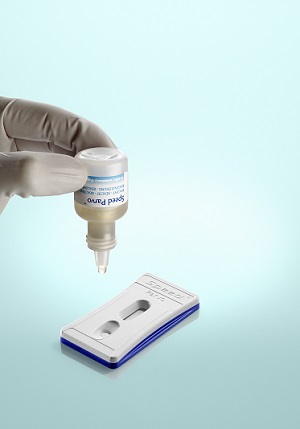Speed Parvo
Rapid detection of Canine Parvovirus antigens
| Presentation | Advantages | |
|---|---|---|
|
Method: Membrane immunochromatography Analysis: Assay for specific antigens of strains CPV 2, 2a, 2b and 2c of canine parvovirus Sample: faeces Preparation: 2 minutes Reading: 10 minutes Storage: 24 months at room temperature (2°C -30°C) Presentation: 5 tests Performance: In comparison with the standard reference method, ELISA laboratory kit: |
|
| Why to use Speed Parvo ? |
|---|
|
Canine Parvovirus causes severe intestinal infections in puppies (haemorrhagic gastroenteritis). The risk of contamination with canine parvovirus is at its greatest between 6 and 12 weeks of age, when serum levels of maternal antibodies drop (2). The risk of mortality is then very high (up to 50%). Due to the highly resistant nature of the virus in the environment, the disease may persist in a kennel endemically. In kennels, an early diagnosis of the disease is therefore fundamental. |
| When to use Speed Parvo ? |
|---|
|
Speed Parvo is a test for the detection of viral antigens. Thus, the virus can be detected in the faeces from the onset of the first symptoms. In group boarding situations, Speed Parvo enables the rapid implementation of prophylactic, isolation and disinfection measures to limit the spread of the disease. In most of countries, it is an offence to sell dogs that are infected with Parvovirus. Speed Parvo ensures the rapid and early detection of the disease, from the end of the incubation period (3 to 4 days). |
Instructions for use
Bibliography:
(1) KAADEN OR. Comparative study of Speed® Parvo with an ELISA laboratory kit (95 dog feces). Ludwig-Maximilians-Univessitat, München, 1998, unpublished.
(2) LEGEAY Y. Parvovirose et gastro-entérites infectieuses canines – Encyclopédie Vétérinaire, 1992, Médecine Générale 1000, 6p.


